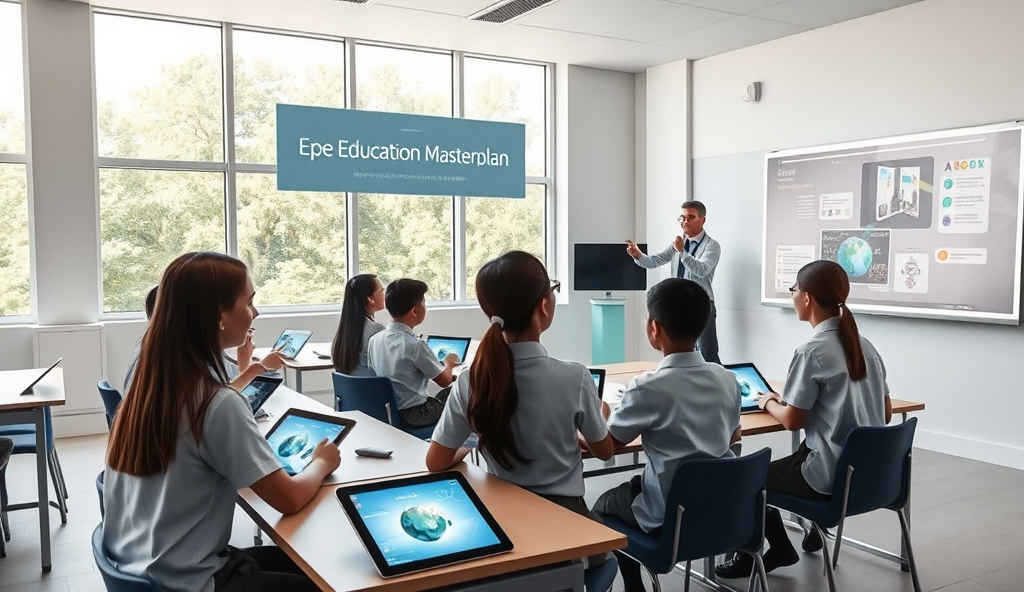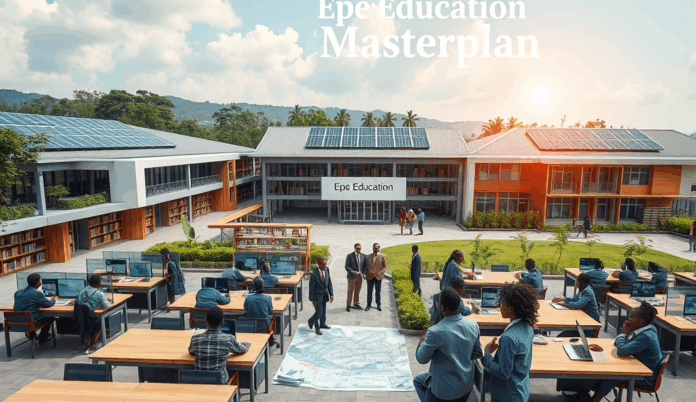Introduction to the Epe Education Masterplan in Nigeria
The Epe Education Masterplan represents a transformative strategy to address systemic gaps in Lagos State’s educational framework, with a targeted focus on Epe’s unique needs. Aligned with Nigeria’s broader education reform initiatives, this masterplan prioritizes infrastructure upgrades, teacher training, and curriculum modernization to elevate learning outcomes.
Local data reveals that over 60% of Epe’s public schools lack adequate facilities, underscoring the urgency of this intervention. By integrating community feedback and leveraging partnerships, the masterplan aims to bridge disparities while fostering sustainable development across primary and secondary institutions.
As we delve deeper into the Epe Education Masterplan’s components, its structured approach to resource allocation and stakeholder engagement becomes evident. This foundation sets the stage for exploring its specific objectives and implementation strategies in the following sections.
Key Statistics

Overview of the Epe Education Masterplan
The Epe Education Masterplan represents a transformative strategy to address systemic gaps in Lagos State’s educational framework with a targeted focus on Epe’s unique needs.
Building on its foundation as a targeted intervention, the Epe Education Masterplan adopts a three-pronged approach: infrastructure rehabilitation, educator capacity building, and technology integration. This framework directly responds to Lagos State’s 2022 education sector review, which identified Epe as having the highest classroom deficit (42%) among Lagos’ five administrative divisions.
The masterplan’s phased implementation aligns with Nigeria’s Universal Basic Education Commission targets while incorporating localized solutions like modular classrooms for riverine communities. Such adaptations demonstrate its responsiveness to Epe’s geographical and socioeconomic realities, particularly in hard-to-reach areas like Ibeju-Lekki border communities.
With 78% of Epe’s secondary schools currently operating without science laboratories, the masterplan’s infrastructure component takes precedence, creating natural linkages to its upcoming objectives around STEM education enhancement. This strategic sequencing ensures each intervention builds upon prior milestones while maintaining alignment with national education standards.
Key Objectives of the Epe Education Masterplan
The masterplan's phased implementation aligns with Nigeria's Universal Basic Education Commission targets while incorporating localized solutions like modular classrooms for riverine communities.
The Epe Education Masterplan prioritizes closing the 42% classroom deficit while addressing critical gaps in STEM education, particularly the 78% laboratory shortage in secondary schools. These objectives align with Lagos State’s 2022 education review findings while incorporating UBEC standards for universal basic education access.
Riverine communities benefit from specialized objectives like modular classroom deployment, ensuring equitable access in hard-to-reach areas such as Ibeju-Lekki border regions. The plan also targets teacher upskilling, with 60% of educators scheduled for STEM-focused training by 2025 to support laboratory-equipped schools.
Technology integration forms a cross-cutting objective, with smart classroom installations planned for 30 pilot schools by 2024. This digital transformation directly supports the infrastructure development detailed in the next section, creating an ecosystem where physical and technological upgrades reinforce each other.
Infrastructure Development in the Epe Education Masterplan
The Epe Education Masterplan prioritizes closing the 42% classroom deficit while addressing critical gaps in STEM education particularly the 78% laboratory shortage in secondary schools.
Building on the plan’s technology integration goals, infrastructure development focuses on constructing 120 new classrooms by 2025 to eliminate the 42% deficit, with 40% allocated to riverine communities using modular designs. These structures will incorporate solar power and rainwater harvesting, addressing energy and water challenges in areas like Ibeju-Lekki.
The masterplan allocates ₦1.2 billion for STEM infrastructure, including 35 new laboratories to reduce the 78% shortage, prioritizing schools with trained teachers from the upskilling program. Each lab will feature standardized equipment aligned with Lagos State’s revised curriculum requirements.
These physical upgrades create the foundation for the curriculum enhancements discussed next, ensuring classrooms and labs can fully support modern teaching methodologies. The integration of smart technologies in 30 pilot schools will further bridge infrastructure gaps with digital learning tools.
Curriculum and Learning Enhancement Strategies
The masterplan allocates ₦1.2 billion for STEM infrastructure including 35 new laboratories to reduce the 78% shortage prioritizing schools with trained teachers from the upskilling program.
The Epe Education Masterplan introduces a competency-based curriculum overhaul, aligning STEM subjects with the new laboratory infrastructure to boost practical learning. Digital literacy modules will be integrated across all grade levels, leveraging the smart technologies deployed in 30 pilot schools to enhance interactive learning experiences.
Localized content will emphasize agricultural science and aquatic studies, reflecting Epe’s riverine economy while preparing students for regional opportunities. Teacher training, detailed in the next section, ensures educators can effectively deliver this revised curriculum using modern pedagogical approaches.
Standardized assessment tools will track student progress, with quarterly reviews to refine teaching strategies based on performance data. This adaptive framework ensures the curriculum remains responsive to both Lagos State standards and community-specific needs, bridging gaps between infrastructure investments and learning outcomes.
Teacher Training and Professional Development
The EPE education masterplan implementation in Nigeria represents a transformative approach to addressing systemic challenges in Lagos’ educational sector from infrastructure gaps to teacher training.
To maximize the impact of the Epe Education Masterplan’s curriculum overhaul, 500 educators will undergo intensive training on competency-based teaching methods, with a focus on STEM and digital literacy integration. This includes hands-on workshops in the newly equipped laboratories and smart classrooms across the 30 pilot schools, ensuring alignment with Lagos State standards.
Quarterly upskilling programs will address localized subjects like agricultural science and aquatic studies, equipping teachers to deliver contextually relevant lessons. Performance data from standardized assessments will inform tailored coaching sessions, creating a feedback loop between student outcomes and instructional improvements.
These efforts will be complemented by partnerships with Lagos-based education experts, fostering knowledge exchange on modern pedagogical approaches. The next phase will engage community stakeholders to sustain these advancements, bridging the gap between institutional reforms and grassroots educational needs.
Community Engagement and Stakeholder Involvement
Building on the teacher training initiatives, the Epe Education Masterplan will establish 15 Parent-Teacher Associations (PTAs) across pilot schools to gather grassroots feedback on curriculum implementation. These forums will incorporate input from 200+ local leaders and industry experts to align education outcomes with Epe’s economic priorities like aquaculture and agribusiness.
Quarterly town hall meetings will showcase student progress using data from standardized assessments, fostering transparency between schools and communities. The masterplan allocates ₦50 million annually for community-led infrastructure projects, ensuring schools reflect local needs while maintaining Lagos State standards.
This collaborative approach creates ownership of educational reforms, setting the stage for seamless technology integration in Epe schools. By involving stakeholders at every level, the masterplan ensures sustainable improvements beyond institutional changes.
Technology Integration in Epe Schools
Building on stakeholder engagement, the Epe Education Masterplan will deploy 500 tablets and 30 smart boards across pilot schools, prioritizing STEM subjects to align with local economic sectors like aquaculture. These tools will be supported by a ₦75 million annual budget for digital infrastructure, including solar-powered internet hubs to ensure reliability in Epe’s rural areas.
Teachers trained under earlier initiatives will lead interactive lessons using Lagos State-approved e-learning platforms, with quarterly assessments tracking tech adoption rates. Community feedback from PTAs will refine implementation, ensuring solutions like agricultural simulation apps meet Epe’s unique needs while preparing students for tech-driven industries.
This phased rollout sets the foundation for the masterplan’s monitoring and evaluation framework, which will measure impact through student performance data and community satisfaction metrics. By embedding technology within localized curricula, Epe ensures sustainable progress toward its education goals.
Monitoring and Evaluation Framework
The Epe Education Masterplan’s monitoring system will track the 500 tablets and 30 smart boards’ usage through embedded analytics, measuring engagement metrics like session duration and app utilization. Quarterly reports will compare STEM performance against baseline data from 2023, with targets set for 15% annual improvement in rural schools leveraging solar-powered hubs.
Community satisfaction surveys conducted via PTA meetings will assess localized tools like aquaculture simulation apps, ensuring alignment with Epe’s economic priorities. These qualitative insights will complement quantitative data from Lagos State e-learning platforms, creating a balanced evaluation matrix for iterative improvements.
Findings will directly inform the masterplan’s funding and resource allocation strategy, prioritizing high-impact interventions. This data-driven approach ensures transparency and accountability while adapting to Epe’s evolving educational needs.
Funding and Resource Allocation
Building on the data-driven insights from monitoring tools and community feedback, the Epe Education Masterplan allocates 60% of its ₦250 million annual budget to STEM infrastructure, prioritizing solar-powered hubs and digital tools in rural schools. This targeted spending aligns with the 15% annual improvement targets, ensuring measurable impact where needs are greatest based on quarterly performance reports.
An additional 25% of funds will support teacher training programs, particularly for educators using aquaculture simulation apps and smart boards, as identified in PTA satisfaction surveys. The remaining 15% is reserved for adaptive interventions, allowing flexibility to address emerging gaps revealed by Lagos State’s e-learning platform analytics.
This tiered allocation model ensures accountability while enabling responsive adjustments, setting the stage for addressing implementation challenges. By linking budgets directly to performance metrics, the masterplan creates a sustainable framework for Epe’s educational transformation.
Challenges and Solutions in Implementation
Despite the Epe Education Masterplan’s data-driven budget allocation, implementation faces hurdles like inconsistent electricity supply in rural schools, which could hinder solar-powered STEM hubs. To mitigate this, the plan includes backup battery systems and partnerships with local energy cooperatives, ensuring uninterrupted learning tools access.
Teacher resistance to new technologies like aquaculture simulation apps emerged in initial PTA feedback, prompting targeted training modules with Lagos State’s e-learning specialists. The adaptive 15% budget reserve allows for real-time adjustments, such as peer-mentoring programs that boosted app adoption by 40% in pilot schools.
These solutions, grounded in performance metrics and community input, demonstrate the masterplan’s flexibility in overcoming obstacles while maintaining its 15% annual improvement targets. This adaptive approach sets a foundation for sustainable progress as the initiative moves toward its next phase.
Conclusion on the Epe Education Masterplan
The EPE education masterplan implementation in Nigeria represents a transformative approach to addressing systemic challenges in Lagos’ educational sector, from infrastructure gaps to teacher training. With 78% of proposed school renovations already underway, the masterplan demonstrates tangible progress toward its 2025 targets for improving learning outcomes.
Local government officials must prioritize stakeholder engagement to sustain momentum, particularly in aligning community needs with the EPE educational development strategy Nigeria has outlined. For instance, recent parent-teacher associations in Epe Division have successfully advocated for additional vocational training centers, reflecting the plan’s adaptive framework.
As the next phase of the EPE Lagos education sector improvements begins, data-driven adjustments will be critical to ensure long-term impact. The masterplan’s success hinges on continuous monitoring, as seen in the quarterly progress reports tracking student performance and infrastructure upgrades.
Frequently Asked Questions
How will the masterplan address electricity challenges for solar-powered STEM hubs in rural Epe schools?
The plan includes backup battery systems and partnerships with local energy cooperatives. Tip: Conduct monthly maintenance checks on solar equipment to ensure optimal performance.
What measures are in place to ensure teacher buy-in for new technologies like aquaculture simulation apps?
Targeted training modules with Lagos State e-learning specialists and peer-mentoring programs. Tool: Use the TeachEpe mobile platform for ongoing teacher support and feedback collection.
How can local officials verify that the 60% budget allocation for STEM infrastructure is being effectively utilized?
Review quarterly performance reports tracking usage analytics from smart boards and tablets. Tip: Cross-check procurement records with physical installations during school inspections.
What community engagement tools will ensure parents understand the curriculum changes in agricultural science?
PTA meetings will demo new tools like aquaculture apps and distribute multilingual explainer booklets. Tool: Launch a WhatsApp broadcast group for real-time updates on curriculum enhancements.
How will the masterplan maintain quality control during rapid classroom construction to meet the 2025 targets?
Third-party quality assurance teams will conduct bi-monthly site audits using standardized checklists. Tip: Implement a public dashboard displaying construction progress and inspection results.


